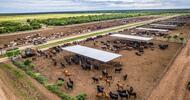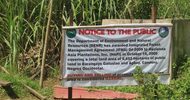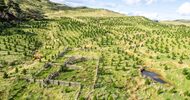Developed nations attempt to secure supplies of food and biofuels to mitigate the impacts of climate change on the food and energy security of their populations, Khadija Sharife writes in this week’s Pambazuka News
- Pambazuka
-
26 November 2009
The ministerial Forum on China-Africa Cooperation met in Sharm el-Sheik, Egypt, last week, attended by Chinese Premier Wen Jiabao and representatives of more than 300 Chinese companies.
- World Socialist Website
-
16 November 2009
Besides energy and minerals, which make up the lion's share of African exports to the BRICs countries, there is growing interest in its arable land - less than 25 percent of which is cultivated - as a source of food for export.
New code of conduct could limit aggressive moves by China, South Korea and Gulf states who have been buying vast tracts of agricultural land
- The Guardian
-
02 November 2009
"With hungry countries desperately in need of food, Ukraine land certainly provides the vehicle for a strategic investment in soft commodities." Commercial pitch for foreign investment in Ukranian farmland.
Participants of the ‘Jang Economic Session’ have opposed the policy to transfer land either on lease or on permanent basis to foreigners on the pretext of corporate farming.
China's agricultural investments strategies in Africa are not as self-serving as some critics argue.
- Asia Times
-
01 October 2009
Citadel, which also announced on Tuesday that it was investing in 500,000 feddans (210,000 hectares) of farmland in Sudan, is also looking to potential investments elsewhere in Africa: Uganda, Kenya, Ethiopia.
- Reuters
-
29 September 2009
Key areas of investment interest from pension and sovereign wealth funds in UK, Middle East, Europe and the US include agriculture land in Australia, South and North America, and throughout Europe.
- Financial Standard
-
28 September 2009
The Asian Human Rights Commission (AHRC) urges the government to seriously reconsider its plan to sell land to Saudi Arabia and other foreign investors, taking into account the welfare of hundreds of thousands of peasants whose livelihood will be directly affected.
- Asian Human Rights Commission
-
25 September 2009
The Bangkok Post asked two prominent figures to discuss the pros and cons of foreign farmland ownership.
- Bangkok Post
-
31 August 2009
The terms of farmland deals are hardly made public. Although a theoretical possibility exists in a few cases for some transfer of technology for agricultural development, risk also exists to peasant farmers who cannot compete with well-resourced commercial farms. Take, for instance, the case of barley and oilseeds producers in Ethiopia.
- Abugida Info
-
13 August 2009
The Gulf countries remain 'highly vulnerable' to commodity price volatility on international markets, as the recent surge in sugar prices shows.
If the host state and foreign investors act in conformity with these suggestions, they will maximise the prospects that any large-scale land transaction benefits all stakeholders and minimise the chances of concluding harmful deals.
A multilateral framework would not only improve the protection of the human rights of the local population concerned; it could also avoid beggar-thy-neighbour policies, with countries competing against each other for foreign direct investment and thus lowering the requirements imposed on foreign investors.
- UN SR on Right to Food
-
21 July 2009
2009 is the year characterised by Arab' 'land grabs', where developing countries have been targeted by the kingdom as having the potential to feed the swelling food demands of Saudi Arabia
- Companies and Markets
-
17 July 2009
IFAD is supporting a pilot initiative to promote properly structured ("win-win") agricultural land deals in Ghana.
A focus on agricultural productivity should not become a cover for foreign private companies to grab land or impose expensive, input-intensive methods in the name of modernisation.
During the recent review of Cambodia before the Committee on Economic, Social and Cultural Rights, several Committee members raised concerns about the potential effects a land deal with the Kuwaiti government could have on various economic, social and cultural rights in Cambodia, including the rights to food, housing and an adequate standard of living.
As world population expands, the demand for arable land should soar. At least that's what George Soros, Lord Rothschild, and other investors believe.
A recent jump in rich country land purchases in the developing world has caught the attention of analysts in trade and human rights circles.
- Bridges Weekly Trade News Digest
-
20 May 2009
On May 5, the Wilson Center hosted a half-day conference that considered the implications for investors, host countries, and food security, highlighting case studies from Asia, Africa, Europe, and the former Soviet Union.
- The New Security Beat
-
12 May 2009
The International Food Policy Research Institute said 15 million to 20 million hectares of farmland in poor nations were sold since 2006, or were under negotiation for sale to foreign entities.
Essentially, the Middle East is left with two choices. “The region has to import. The question is, invest abroad or rely on the free market?” said Dr Eckart Woertz, program manager in economics at the Gulf Research Center in Dubai.
The Philippines has signed a $300-million investment agreement with Bahrain to establish agro-fishery businesses in the country.
- Manila Standard
-
30 Mar 2009
With Gulf countries and businesses demonstrating a newfound disposition for direct farm investment to cater for their local agro commodity needs, Sub-Saharan Africa has been identified as a source of growing and/or producing their imported food. Nigeria’s position in the matrix cannot be overemphasized.
Tanri said the government was eager to encourage and provide support to deep-pocketed business leaders from the Middle East to invest in Indonesia.
- Jakarta Globe
-
17 January 2009
Lonrho Agriculture will develop 25,000 hectares of agricultural projects in the Provinces of Uige, Zaire and Bengo in Angola.
- Lonrho PLC
-
13 January 2009
The reported land deal between Kenya and Qatar is not unique. The Philippines Department of Agrarian Reform said in 2007 it was looking at large tracts of land for agribusiness development under a MoU signed with China. The memo calls for the development of land to grow hybrid corn, rice and sorghum.
- The Standard (Nairobi)
-
06 January 2009
Sudan is hoping to use foreign cash to reinvigorate its under-performing agricultural sector, but there is growing disagreement over the extent to which outsiders, rather than local farmers, should be taking control of the industry.














